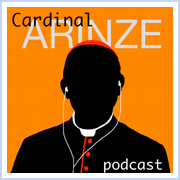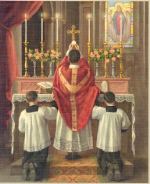3rd Week of Easter - Fruits of the Resurrection
"I know mine and mine know me." St. John, 11:14.
"The third day he rose again from the dead." Creed.
In World War Two we read with horror of the beastly bombing of cities, the killing and crippling of innocent women and children. With sickening terror we heard of the bombing of London in the never-to-be-forgotten Battle of Britain. Whole blocks of buildings were levelled to the ground. Houses crumbled as if made of match boxes. In many places nothing was left but piles of rubble and debris heaped up beside hellish holes gashed into the earth.
Not long after the smoke and dust cleared away the people noticed flowers growing up the sides of these craters, flowers which they could not recognize or name. Horticulturists or flower experts were called to investigate, but even they could not identify the blossoms.
They searched the records in the Natural History department of the British Museum at South Kensington. They finally found some rare old manuscripts and books which had records pf these species long since died out. There were ninety different kinds. These flowers, or the seeds of these flowers, had been buried for hundreds of years under the streets and buildings of London. The German bombs stirred them up, cultivated them, if you will, and the nitrates in the bombs nourished the strange plants.
In a similar way the death and resurrection of Jesus Christ has produced many fruits, fruits which we would not have shared, were it not for Good Friday and Easter Sunday. The earth shook at the death of Christ, and the earth shook at the resurrection of Christ. We would like to mention a few of the blessings and benefits of those earthquakes.
The first fruit of His rising from the dead is the praising of God's justice. The Almighty had allowed the enemies of Christ to do their worst. He permitted the powers of evil to go to the very limits of injustice. But with Easter day came the hour for justice, to exalt the humble Christ above His enemies, and to punish those who had put Him to death. As St. Paul wrote to the Philippians, 2:8-9: "He humbled himself, becoming obedient unto death, even to the death of the cross. For which cause God also hath exalted him."
Another fruit of Easter is the perfecting of our faith. Without the resurrection our faith is without a foundation. Everything Christ had said and done throughout His life demanded a resurrection as a final, conclusive proof that He was God, and that He had worked His wonders as God. In telling the world about Christ the apostles repeatedly, almost constantly, referred to the resurrection. It gave flesh and bone to their faith.
The resurrection also strengthens our hope. It refreshes our hope of spiritual help; it enlivens our hope of a true reward; it stimulates our hope in our own resurrection. What St. Paul wrote to the Romans, he wrote to us: "If we have been planted together in the likeness of His death, we shall be also in the likeness of His resurrection." Romans, 6:5. The Prince of the Apostles in his first letter (1:3-4), says the same: "Blessed be the God and Father of our Lord Jesus Christ, who according to His great mercy hath regenerated us unto a lively hope, by the resurrection of Jesus Christ from the dead, unto the inheritance incorruptible."
Man lives on hope and in hope, even in material things. Hope is essential in spiritual life. The bells and Alleluias of Easter give grounds to our hope.
Easter serves another purpose: it gives us a model for Christian life; it suggests that we rise from the grave of sin. St. Paul put it very well when he wrote to the Romans, 6:4, 11: "As Christ is risen from the dead. . . so we also may walk in newness of life. . . dead to sin, but alive to God."
Christ coming forth from the grave also proves the true human nature of the Savior. In a talk months ago we saw that some deny to Christ a real human nature. We also learned that He was true man nevertheless. His death and resurrection clinch that proof. He delayed His rising for three days to make that proof all the more powerful.
His rising was not delayed too long, however, as He wanted it to be the crowning proof of His divinity. Jesus, by His absolute power, could have remained in the grave a year or a thousand years. He could have postponed His resurrection until 2006. But the Christians of the last nineteen plus centuries would have been denied this evidence of His divinity.
In rising the third day Jesus fulfilled several prophecies. For us who follow Him that is welcome fruit, because we count on all His words, we bank on them, we depend on them. So far He has kept every promise He made.
Best of all, His rising makes sure our rising. In the words of St. Paul: "We look for the Savior, our Lord Jesus Christ, who will reform the body of our lowness, made like to the body of his glory." Philippians, 3:20, 21.
Indeed, the terror, the upheaval, the bitterness and tears of Holy Week, coming to a climax on Easter morning - all of it was necessary to make these otherwise impossible fruits grow in the garden of God's love for us.
The Good Shepherd laid down His life for us. And the Good Shepherd took up His life for us. Laying it down and taking it up were the sources of much blessing.
May Easter satisfy God's justice! May Easter fire our faith, inspire our hope, and feed our resolve to live a risen life with Christ! Amen.
__________________________
Adapted from Talks on the Creed
by Fr. Arthur Tonne, OFM (© 1946)












